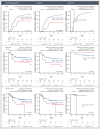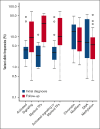Mutations in myeloid transcription factors and activated signaling genes predict chronic myeloid leukemia outcomes
- PMID: 38447114
- PMCID: PMC11127220
- DOI: 10.1182/bloodadvances.2023012127
Mutations in myeloid transcription factors and activated signaling genes predict chronic myeloid leukemia outcomes
Abstract
Advancements in genomics are transforming the clinical management of chronic myeloid leukemia (CML) toward precision medicine. The impact of somatic mutations on treatment outcomes is still under debate. We studied the association of somatic mutations in epigenetic modifier genes and activated signaling/myeloid transcription factors (AS/MTFs) with disease progression and treatment failure in patients with CML after tyrosine kinase inhibitor (TKI) therapy. A total of 394 CML samples were sequenced, including 254 samples collected at initial diagnosis and 140 samples taken during follow-up. Single-molecule molecular inversion probe (smMIP)-based next-generation sequencing (NGS) was conducted targeting recurrently mutated loci in 40 genes, with a limit of detection of 0.2%. Seventy mutations were detected in 57 diagnostic samples (22.4%), whereas 64 mutations were detected in 39 of the follow-up samples (27.9%). Carrying any mutation at initial diagnosis was associated with worse outcomes after TKI therapy, particularly in AS/MTF genes. Patients having these mutations at initial diagnosis and treated with imatinib showed higher risks of treatment failure (hazard ratio, 2.53; 95% confidence interval, 1.13-5.66; P = .0239). The adverse prognostic impact of the mutations was not clear for patients treated with second-generation TKIs. The multivariate analysis affirmed that mutations in AS/MTF genes independently serve as adverse prognostic factors for molecular response, failure-free survival, and progression risk. Additionally, there was an observable nonsignificant trend indicating a heightened risk of progression to advanced disease and worse overall survival. In conclusion, mutations in the AS/MTF genes using smMIP-based NGS can help identify patients with a potential risk of both treatment failure and progression and may help upfront TKI selection.
© 2024 by The American Society of Hematology. Licensed under Creative Commons Attribution-NonCommercial-NoDerivatives 4.0 International (CC BY-NC-ND 4.0), permitting only noncommercial, nonderivative use with attribution. All other rights reserved.
Conflict of interest statement
Conflict-of-interest disclosure: D.D.H.K. received honoraria from Bristol Myers Squibb and Novartis, and is involved in consultancy for Novartis, Pfizer, and Paladin. The remaining authors declare no competing financial interests.
Figures





Similar articles
-
BCR-ABL kinase domain mutations, including 2 novel mutations in imatinib resistant Malaysian chronic myeloid leukemia patients-Frequency and clinical outcome.Leuk Res. 2014 Apr;38(4):454-9. doi: 10.1016/j.leukres.2013.12.025. Epub 2014 Jan 6. Leuk Res. 2014. PMID: 24456693
-
Incidence and outcome of BCR-ABL mutated chronic myeloid leukemia patients who failed to tyrosine kinase inhibitors.Cancer Med. 2019 Sep;8(11):5173-5182. doi: 10.1002/cam4.2410. Epub 2019 Jul 27. Cancer Med. 2019. PMID: 31350815 Free PMC article.
-
Long-term outcome of patients with chronic myeloid leukemia treated with second-generation tyrosine kinase inhibitors after imatinib failure is predicted by the in vitro sensitivity of BCR-ABL kinase domain mutations.Blood. 2009 Sep 3;114(10):2037-43. doi: 10.1182/blood-2009-01-197715. Epub 2009 Jun 30. Blood. 2009. PMID: 19567878 Free PMC article.
-
Use of second- and third-generation tyrosine kinase inhibitors in the treatment of chronic myeloid leukemia: an evolving treatment paradigm.Clin Lymphoma Myeloma Leuk. 2015 Jun;15(6):323-34. doi: 10.1016/j.clml.2015.03.006. Epub 2015 Mar 24. Clin Lymphoma Myeloma Leuk. 2015. PMID: 25971713 Free PMC article. Review.
-
Laying the foundation for genomically-based risk assessment in chronic myeloid leukemia.Leukemia. 2019 Aug;33(8):1835-1850. doi: 10.1038/s41375-019-0512-y. Epub 2019 Jun 17. Leukemia. 2019. PMID: 31209280 Free PMC article. Review.
Cited by
-
Evaluating a predictive model of tyrosine kinase inhibitor therapy failure in a European-type cohort: a step towards population-specific tools.Leukemia. 2025 Aug 1. doi: 10.1038/s41375-025-02703-6. Online ahead of print. Leukemia. 2025. PMID: 40750677
-
A CML Patient Carrying BCR::ABL1 Splicing Variants Did Not Experience Blast Crisis for 15 Years without Responding to Various TKIs.Intern Med. 2025 Feb 1;64(3):455-458. doi: 10.2169/internalmedicine.4163-24. Epub 2024 Sep 7. Intern Med. 2025. PMID: 39198163 Free PMC article.
-
Advancing chronic myeloid leukemia research with next-generation sequencing: potential benefits, limitations, and future clinical integration.Hum Genet. 2025 May;144(5):481-503. doi: 10.1007/s00439-025-02745-x. Epub 2025 Apr 21. Hum Genet. 2025. PMID: 40257486 Review.
References
-
- Kim T, Tyndel MS, Kim HJ, et al. Spectrum of somatic mutation dynamics in chronic myeloid leukemia following tyrosine kinase inhibitor therapy. Blood. 2017;129(1):38–47. - PubMed
-
- Branford S, Wang P, Yeung DT, et al. Integrative genomic analysis reveals cancer-associated mutations at diagnosis of CML in patients with high-risk disease. Blood. 2018;132(9):948–961. - PubMed
Publication types
MeSH terms
LinkOut - more resources
Full Text Sources
Medical
Research Materials
Miscellaneous

